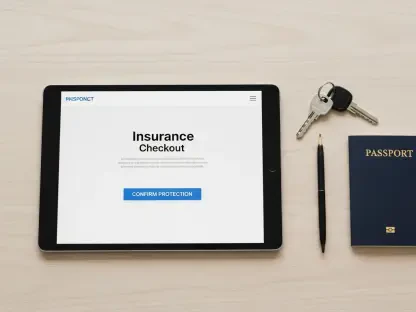In the aftermath of catastrophic flooding in Central Texas, residents face the difficult task of recovery while being vulnerable to fraudulent activities. Simon Glairy, a leading expert in insurance fraud prevention, shares his insights on how the National Insurance Crime Bureau (NICB) is acting to protect residents from deceitful contractors. With a wealth of expertise in risk management and AI-driven risk assessment, Simon offers valuable advice on navigating these challenging situations.
Can you explain the role of the National Insurance Crime Bureau in disaster situations like the Central Texas flooding?
The NICB plays a crucial role in disaster situations by focusing its efforts on preventing and detecting insurance fraud, which tends to surge after such events. Essentially, they act as a watchdog, raising awareness about potential fraud schemes and educating the community on how to avoid becoming victims. They work alongside local, state, and federal law enforcement agencies to ensure a coordinated response that not only addresses immediate recovery needs but also proactively safeguards residents from the risks posed by fraudulent contractors seeking to exploit the chaos following disasters like the Central Texas flooding.
How is NICB currently working with local, state, and federal law enforcement agencies to aid in the recovery process?
NICB collaborates with various agencies to establish a network dedicated to tracking and investigating fraudulent behavior. By pooling resources and expertise, NICB and these agencies can swiftly respond to reports of fraud, ensuring that affected communities receive genuine assistance. This partnership is key in effectively combatting fraud, as it allows for a broad, unified approach that extends beyond initial disaster recovery efforts and continues throughout the rebuilding process.
What specific measures is NICB taking to support residents in preventing contractor fraud?
NICB is proactive in disseminating information that helps residents recognize and avoid fraudulent contractors. They provide resources such as a downloadable contractor checklist and open lines for direct communication, where residents can report suspicious activities. Furthermore, NICB agents deploy on the ground to offer assistance and guidance, helping to identify genuine contractors and establish a trusted network within affected areas. This hands-on approach is vital in building awareness and confidence among residents in navigating the rebuilding process.
Could you elaborate on the potential fraud schemes that residents should be aware of after natural disasters?
Residents should be wary of scams involving promises of quick debris removal, home reconstruction services, and even medical aid. Fraudsters often appear soon after a disaster, offering services that sound indispensably urgent. Common tactics include high-pressure sales pitches, demanding upfront payments, and contracts laden with blank spaces or clauses that exploit residents’ vulnerability, such as the Assignment of Benefits provisions. Recognizing these schemes early is essential in protecting personal and financial interests.
What are some red flags that might indicate a contractor is potentially untrustworthy?
Signs of potentially fraudulent contractors include insistence on immediate contract signing, especially with incomplete or ambiguous paperwork. If they require substantial upfront payments or press for signing an Assignment of Benefits, it’s wise to pause and reassess the situation. High-pressure tactics are also indicative of deceitful intent; legitimate contractors generally operate with transparency and patience, granting time for thorough consideration and verification of their credentials.
Could you discuss the risks associated with signing an Assignment of Benefits agreement with contractors?
An Assignment of Benefits (AOB) agreement transfers the rights of insurance payouts from the insured party to a contractor, often allowing the contractor control over financial decisions and claims without input from the homeowner. While it might seem convenient, it poses significant risks if the contractor is fraudulent, as it can lead to inflated charges, incomplete work, or a total disappearance post-payment. Understanding this agreement fully before signing is vital to prevent losing control over the situation and potentially incurring additional financial burdens.
What steps can residents take to verify the credentials of a contractor they are considering hiring?
Verification of a contractor’s credentials involves a multi-step process: checking for licenses and documentation, confirming their reputation through reviews and references, and consulting with insurance carriers to validate their credibility. Leveraging resources provided by NICB, such as the contractor checklist, can guide residents through these steps. Additionally, residents should trust their instincts if something feels off, opting for further investigation or a second opinion to ensure peace of mind.
How can residents differentiate between a genuine contractor and a fraudulent one?
Authentic contractors exhibit professionalism through clear communication, transparent paperwork, and willingness to provide licensing information upfront. They will generally offer a detailed plan and timeline for the project, along with references or previous client testimonials. Fraudulent contractors might focus on extracting quick money, display reluctance to share credentials, or evade direct questions concerning their background and methodology. Observing these behaviors can aid residents in making informed choices.
Can you provide some examples of high-pressure sales tactics used by fraudulent contractors?
Fraudulent contractors often aim to create a sense of urgency, pushing residents to sign contracts immediately to secure supposedly limited availability. They might use fear-based tactics, convincing homeowners that delays in decision-making will exacerbate damage or lead to higher costs. These tactics rely on emotional manipulation, and spotting them early can prevent hasty decisions that are financially and personally detrimental.
How can residents protect themselves from these tactics, especially during door-to-door solicitation?
During door-to-door solicitations, it’s essential for residents to maintain a skeptical outlook and engage in thorough questioning. Avoid immediate commitments, and request written estimates and business information for independent verification. Consulting with insurance providers or trusted neighbors can provide further assurance. Residents should prioritize taking their time to consider options, proving a useful defense against aggressive and fraudulent sales practices.
What is included in the contractor checklist offered by NICB, and how can residents access it?
The checklist encompasses steps to vet potential contractors, such as confirming authenticity through licenses, identifying review platforms, and seeking multiple quotes to compare service offers. It also highlights legal facets to consider, like AOB agreements and specific contract details, ensuring comprehensive protection against fraud. Residents can download this valuable resource directly from the NICB website, strengthening their ability to make informed decisions.
Why is it important for residents to understand their insurance policy coverage before a disaster occurs?
Understanding one’s insurance policy before a disaster strikes provides clarity on what is covered and what may require additional preparation or protection. This preemptive knowledge allows homeowners to adjust coverage to better suit their needs, ensuring adequate support for recovery post-disaster. Awareness of policy details can also streamline the claims process and safeguard against the pitfalls of fraudulent practices that exploit ignorance.
How can residents obtain a list of reputable contractors from their insurance carrier?
Insurance carriers often maintain lists of pre-screened contractors who are trusted and vetted through stringent requirements. Residents can contact their insurers directly to request this list and inquire about any additional vetting processes. This proactive approach ensures that residents are more likely to connect with reliable contractors for their rebuilding efforts.
What advice would you give to those who have been impacted by the Central Texas flooding and are looking to begin the rebuilding process?
My advice is to approach the rebuilding process with strategic caution. Take the time to verify contractors through trusted sources, such as insurance companies or NICB resources. Be vigilant of potential fraud indicators and educate yourself on your insurance coverage. Communicate openly with neighbors and local agencies to stay informed of any reported fraudulent activities. Above all, patience and thoroughness in each decision will safeguard you from pitfalls during this challenging time.









